- Home
- Mary Downing Hahn
One for Sorrow Page 6
One for Sorrow Read online
Page 6
Rosie looked surprised. “You heard what the O’Neils said. I made them feel better. How can you find fault with that?”
“And we made ourselves feel better,” Eunice added, “by stuffing ourselves with sweets.”
Eunice was already plump, but I didn’t tell her what I thought—if she kept eating sweets at viewings, she’d need a new wardrobe before Christmas.
After that, we attended at least two viewings a day. With schools and stores and movie theaters closed, what else were we to do?
The dead were strangers, mostly young because that was who Enza preferred—young people in their teens and twenties, some older and some younger, a few much older and a few much younger. The saddest was a toddler barely three years old. She looked like a baby doll, and I was tempted to pick her up and rock her.
Yes, I’d gotten quite used to the dead, so silent, so still, nothing frightening about them after all.
We took care to memorize obituaries so we’d say the right things. How talented artistically or musically, how charitable, how courteous and thoughtful. Never angry. Never mean. No wonder the Lord took them to his bosom, saving them perhaps from future misery.
At night I’d lie in bed and wonder what people would say of me if I died of the flu. I was pretty certain I’d be portrayed as saintly as the other dearly departed. Unless they asked Elsie. She’d make up horrible stories about me. She’d say I was a bad friend. She’d say I was mean to her. She’d lie and say I cheated on tests and copied my homework and stole candy from the corner grocery.
Oh, yes, if I died, Elsie would make up plenty of bad things to say about me.
Eight
NE DAY in that awful autumn of death and funerals and fear, we were walking home from a particularly dreadful viewing—identical twin girls, six years old, laid out in the same coffin, their arms around each other as if they were sleeping. We hadn’t stayed long enough to eat more than one cookie.
Jane was still crying when Rosie stopped so suddenly I bumped into her. “Look who I see.”
She pointed at the park across the street. Elsie was sitting in a swing all by herself, spinning idly, too lazy to push off and soar treetop high.
Lucy giggled. “She’s wearing a flu mask.”
“Too bad it doesn’t hide her whole ugly face,” Eunice said.
We started to walk on, but Rosie remained where she was and stared hard at Elsie. “She got me in trouble the last day of school. Let’s get even.”
Before we could agree or disagree, Rosie charged across the street, whooping like an Indian on the warpath. We followed her, whooping as loudly as we could.
Elsie looked up and saw us coming. She jumped out of the swing and began to run across the park. She was big, but she was clumsy and she couldn’t run fast enough to escape us. Rosie caught her, yanked off her flu mask, and put it on her own face.
“Enza’s coming for you!” she said to Elsie. “She’s going to fly in your window tonight. By tomorrow morning, you’ll be dead!”
“And no one will be sorry. No one will miss you,” Lucy added, “because nobody likes you.”
“You’re mean and you’re a liar and you’re a big fat Hun!” Eunice yelled.
At that, Rosie told us to join hands in a circle, trapping Elsie inside. Round and round we went, faster and faster, chanting,
I had a little bird,
And its name was Enza.
I opened up the window,
And in flew Enza.
The faster we went, the faster we sang, laying particular emphasis on “in flew Enza.”
Elsie ran against us, trying to break her way out of the circle, but we held firm. She couldn’t escape. “Let me out,” she cried. “I want to go home!”
“In flew Enza, in flew Enza,” we shouted. “Had a little bird, name was Enza, opened window, IN FLEW ENZA!”
“I’ll tell my mother on you!”
“I’ll tell my mother on you, I’ll tell my mother on you,” Rosie echoed in a perfect imitation of Elsie’s voice.
We were hysterical, we couldn’t stop. Even when Elsie sank to the ground, crying, we couldn’t stop. Round and round and round her, we ran screaming “IN FLEW ENZA,” until our throats were sore and we were almost too dizzy to stand up.
Finally we broke apart and reeled across the grass, falling into piles of autumn leaves, gasping for breath.
For a moment, Elsie crouched on the ground. She seemed smaller somehow, a rabbit caught by a pack of dogs. Suddenly she looked up and caught me staring at her. Our eyes locked just as they had before. This time, I turned away quickly, ashamed of myself, of all of us.
Elsie scrambled awkwardly to her feet and ran, her arms flapping, knock-kneed, as clumsy as a baby elephant, only much more pathetic.
Following Rosie’s lead, we chased Elsie again, shouting and jeering, myself included, despite my guilty feelings.
“You can’t run from Enza,” Rosie yelled.
We stopped on the edge of the park and watched Elsie cross Prospect Street. She ran more slowly now, her head down. One braid had come loose, and the bow on her dress was untied. She looked so pitiful I turned my head away, afraid she’d catch me staring again. I couldn’t bear the sadness in her eyes.
“Run, baby, run!” Rosie shouted. “Run home to Mama!” Turning to us with a laugh, she said, “I guess we taught her a lesson!”
She was still wearing Elsie’s mask, and it made her look scary.
Lucy snatched the mask from Rosie and put it on. Eunice grabbed it from Lucy. Rosie tried to get it back.
Jane and I watched the three girls play keep away with the mask, but we didn’t join in. For both of us, the fun had gone out of the day.
At last Rosie tossed the mask aside as if it were a dead rat. “Let’s go,” she said.
Without linking arms, we walked slowly across the park, almost deserted in the late afternoon light. Rosie started singing the Enza song, but only Eunice joined in.
I found myself thinking of Elsie crouched on the grass, as helpless as a baby bird. To keep from feeling sorry for her, I reminded myself of what she’d done to my doll and the times she’d tried to get me in trouble with Miss Harrison.
Yes, I thought, Elsie deserved what we’d done to her.
But why did the sight of her flu mask lying in the leaves make me feel sad?
Less than a week later, we were walking down Third Avenue. November had arrived and brought the promise of winter with it. A cold wind sneaked up behind us and crept through the gap between our collars and our necks. It pinched our noses and the tips of our fingers. It seeped up from the pavement, right through the soles of our shoes, and chilled our toes.
We planned to go to a viewing on the other side of the park, a long walk on such a windy day.
“I hate cold weather,” Eunice grumbled.
“But not if it snows,” Rosie said. “Since school’s closed, we can sled ride all day long.” She grinned. “Pop says the Farmer’s Almanac is calling for tons of snow and a long winter.”
“And don’t forget the woolly bear caterpillars,” Jane said. “Every one I’ve seen has a really narrow brown stripe.”
“Ugh.” Eunice shivered. “I hope the almanac is wrong, wrong, wrong.”
While we stood on the corner, a funeral procession came toward us. We waited on the curb and watched a pair of black horses walk slowly past, pulling the hearse. Their glossy necks arched, the black plumes on their heads waved in the breeze. Through the glass windows, I saw the coffin heaped with flowers. Behind it came a long procession of mourners, walking slowly, solemnly. They said nothing, but stared straight ahead. It scared me to watch them coming toward us, each step measured, their faces grim.
“Somebody important must have died,” Eunice said.
“It’s probably the mayor,” Lucy said. “Father is his doctor. Was his doctor, I mean. He told us he’d died.”
As soon as the last mourner passed by, Rosie said, “I guess he won’t be boring the wh
ole town with a long speech this Fourth of July.”
“Don’t be disrespectful,” Lucy said.
Rosie shrugged. “I don’t know about the rest of you, but I’m cold and hungry, and I don’t feel like walking all the way to the other side of the park. Let’s go to that house and get something to eat.”
She pointed at a wreath on a door in the middle of the block. It was a small, shabby house in a row of small and shabby houses, and the wreath was so small we could have easily missed seeing it.
“It’s not on our list,” Eunice said.
“We don’t know who lives there or who died,” Jane added. “We might say the wrong thing.”
“We’ve been doing this for three weeks now,” Rosie said. “We’ll make it up as we go along."
Jane and I exchanged looks, but before we had a chance to protest, Rosie walked boldly up the steps and knocked on the door.
A stern-looking woman invited us inside. “Thank you for coming. You must be my daughter’s classmates.”
“We’re so sorry,” Rosie said, not pausing for a second. It was if she’d memorized a script suitable for all occasions. “We’ll miss her so much. She was so sweet. Everyone adored her.”
I caught Eunice eying the refreshments and hoped the woman wouldn’t notice.
“Come and say goodbye to her,” the woman said.
All five of us arrived at the coffin at the same moment. No longer afraid to look at the dead, we leaned over the side to stare at the body. We all gasped, even Rosie, and backed away, almost tripping over our own feet.
Jane grabbed my hand and began to cry. I held her hand tightly, sure I was about to faint. To swoon. To collapse. My legs shook, and my arms trembled.
“You girls look frightened,” the woman said. “Have you never seen a dead person?”
“It’s such a shock,” Rosie whispered, sounding sincere for once. Her face was so pale every freckle stood out. “We saw her just a few days ago.”
Yes, I thought, we saw her. We chased her and made her our prisoner. We scared her with the Enza song, and Rosie told her she’d die that very night. She took Elsie’s mask and wore it herself.
And now, less than a week later, Elsie lay in her coffin, never to open her eyes or speak again.
“Kneel down by her,” Mrs. Schneider said. “Say a prayer for Elsie.”
I wanted to run from the house and not stop until I got home, but like my friends, I knelt by the coffin.
My face was level with Elsie’s porcelain hands, clasped as if in prayer. I stared at her fingers, white with a tinge of blue like snow. I knew I’d see them in my dreams for years to come.
I glanced at her face. It seemed as if her eyes were open a tiny slit. She was looking at me. No, of course she wasn’t. It was a trick of the light.
Quickly I returned my gaze to her hands. It was safer to look at them than at her face. I stared at her pale fingers as if they held the secret of life and death. “Rest in peace, Elsie,” I whispered. “Forgive me for being mean to you.”
Slowly the five of us stood up and prepared to leave, but Mrs. Schneider stopped us with a question. “Did any of you see Elsie at the park last Wednesday? She came home in tears and told me a gang of girls called her names and chased her. They even stole her flu mask. I’d like to know who those girls are.”
We shook our heads, we didn’t know them, we hadn’t seen them, Elsie was by herself, she was wearing her mask when we saw her.
Mr. Schneider stepped out of a corner and joined us. “I blame them girls for Elsie’s death.” He stared at us, his face as pale and stony as Elsie’s. “If you hear anything, tell me. Their parents should know vat sort of daughters they haf.”
I thought Jane was about to collapse right there and then. Her face was ashen, and her eyes brimmed with tears. She opened her mouth as if to speak, and I seized her arm, afraid of what she might say.
“Jane isn’t well,” I whispered to Mrs. Schneider. “We should leave before she has one of her fainting spells.”
Mrs. Schneider said, “She does look poorly. You can’t take chances these days.”
Mr. Schneider followed us to the door. “You tell me. I vant to know the names of them girls.”
“Yes, sir,” Rosie whispered. “Yes, we will.”
He nodded, and we ran down the front steps as if Elsie herself pursued us.
When we were around the corner and out of sight of Elsie’s house, we stopped to catch our breath. We hadn’t eaten a thing at the viewing, but Rosie leaned over and threw up in the gutter, heaving and heaving until nothing but green bile came up.
Wiping her mouth with the back of her hand, she moaned and clutched her empty belly. “Oh, my God, it’s my fault, it’s all my fault.”
Rosie began crying, something I’d never expected to see her do. We gathered around her, patting her back, stroking her hair, murmuring, but she ignored our attempts to comfort her. “Why did I tell her she’d die? Why did I take her flu mask?”
Eunice grabbed Rosie’s hand and peered into her eyes. “What’s wrong with you? It’s not your fault. It’s not anybody’s fault.” She paused to take a breath. “She was mean, and she lied and tattled on us, and none of us liked her.”
Rosie stared at Eunice. “Don’t you feel bad about what we did? Don’t you care she’s dead?”
“Well, yes, of course, I care.” Eunice backtracked, shifting her position to side with Rosie. “My goodness. I’m just saying it’s not your fault or my fault. None of us is to blame. It was a game, that’s all. We didn’t know she’d die. We didn’t make her die.”
Rosie looked at Jane and me. “What do you think? Did I kill Elsie?”
“No,” I said. “No.” I was scared now.
Tears ran down Rosie’s face, mixing with snot from her nose. “I’m going to hell when I die,” she wailed.
Jane grabbed Rosie’s arm. “You didn’t mean to hurt Elsie, so it’s not a mortal sin. Not the kind you go to hell for.”
Lucy spoke up. “I don’t believe in hell. Or the devil.”
“Everyone believes in hell,” Eunice said, “and the devil.”
Lucy shook her head. “I’m Unitarian, and we don’t believe people are burned in hell. My father says a just God wouldn’t do something that cruel.”
“Our minister says Unitarians aren’t even Christian,” Eunice said.
Just as we were building up to a religious quarrel, a door opened and a man told us to please lower our voices. His wife had flu, and we were disturbing her rest.
After he closed the door, Rosie knuckled her tears away and sniffed. Jane took her hand and squeezed it gently. “Do you feel better now, Rosie?”
“I guess so,” she said in a low voice, “but I still wish I hadn’t taken her mask and said she’d die.”
Eunice looked at all of us. “Let’s promise never to tell anyone what happened in the park. If nobody tells, nobody will know, and we won’t get in trouble.”
Rosie spit in her palm, and we all did the same. Rubbing our hands together, we mixed our spit and swore we’d never tell.
We turned toward home. No one had anything to say. Rosie concentrated on kicking a stone down the sidewalk ahead of her. Jane huddled in her coat as if the autumn wind was as cold as winter. Eunice hummed “I Dream of Jeannie,” an old Stephen Foster song we sang in school. Lucy kicked leaves aside hoping to find a penny or a nickel. And me—I tried to banish the image of Elsie in her coffin to a dark corner of my mind where I wouldn’t have to see it.
First Rosie left us, then Eunice and Lucy. Jane and I walked on, still silent.
Finally Jane asked, “Do you think it’s our fault, Annie?”
I shook my head. “Father would say it’s a coincidence.”
Jane nodded. “That must be it. Like we told Rosie, it’s not anybody’s fault Elsie died.”
But she didn’t sound any more certain than I was. What if it was our fault, what if we were all going to hell for what we did?
We ling
ered on Jane’s corner as if we were afraid to part and go our separate ways. The days were short now, and darkness seemed to creep out of the earth itself. The wind had picked up, and I was cold in the thin jacket I’d put on when I left home.
“Well,” Jane said, “the streetlights are on, and my parents will be worried about me. I’d better go home.”
I watched her walk away, her head down, her footsteps muffled by the fallen leaves. She looked sad and lonely and very small under the row of tall trees bending over the road.
After she disappeared from sight, I pictured a day when I’d be older and my life would be different, and Jane and I wouldn’t be best friends anymore. We might live far apart. I might never know her future, or she mine.
As I went on alone, I promised myself I wouldn’t think about Elsie Schneider lying in her coffin. Her eyes weren’t open, not even a slit. She hadn’t looked at me. She hadn’t, hadn’t, had not looked at me. She couldn’t have. She was dead. Dead. And she was never coming back.
But why did I glance over my shoulder? Why did I imagine I heard footsteps behind me? Why did I run the rest of the way home?
Nine
HAT NIGHT I had little appetite for supper. Mother looked at me with concern. “What’s wrong, Annie? Don’t you feel well?”
Truthfully, I did not feel well. My throat definitely felt scratchy. I had a tiny dry cough. And I felt hot. Flu symptoms, I was certain of it. I’d caught it from Elsie, my punishment for scaring her and making her cry.
Father’s head came up, and he too looked at me. “Check her temperature, Ida,” he said.
This time, Mother did not feel my forehead. She went straight to the bathroom and came back with a thermometer. “Under your tongue,” she said as she slid it between my teeth. “And keep your mouth closed.”
When she removed the thermometer, she squinted at the little silver line, turning the thermometer this way and that, taking so long to make out the degrees that Father snatched it out of her hand.

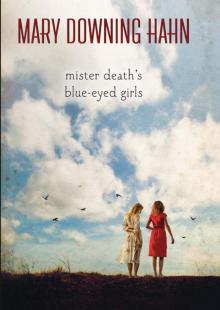 Mister Death's Blue-Eyed Girls
Mister Death's Blue-Eyed Girls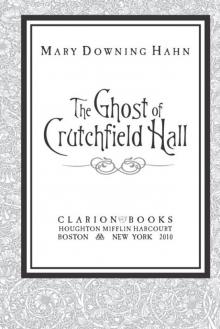 The Ghost of Crutchfield Hall
The Ghost of Crutchfield Hall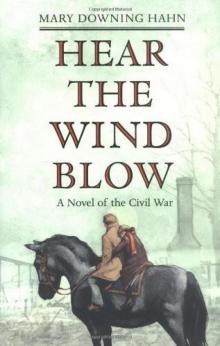 Hear the Wind Blow
Hear the Wind Blow Time of the Witch
Time of the Witch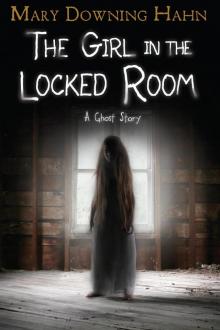 The Girl in the Locked Room: A Ghost Story
The Girl in the Locked Room: A Ghost Story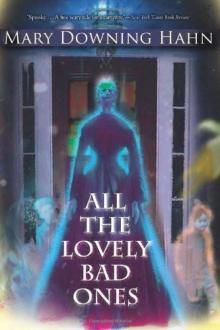 All the Lovely Bad Ones
All the Lovely Bad Ones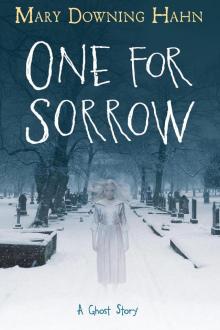 One for Sorrow
One for Sorrow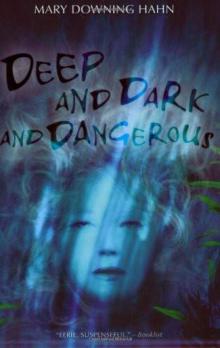 Deep and Dark and Dangerous
Deep and Dark and Dangerous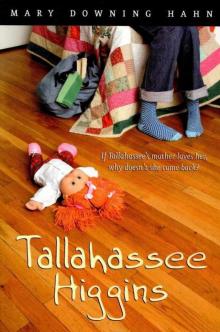 Tallahassee Higgins
Tallahassee Higgins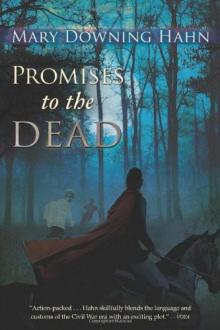 Promises to the Dead
Promises to the Dead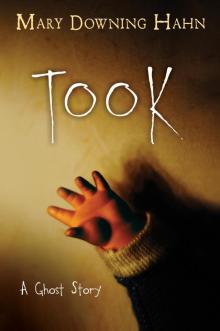 Took: A Ghost Story
Took: A Ghost Story Following My Own Footsteps
Following My Own Footsteps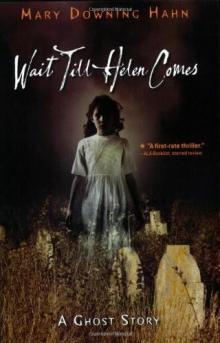 Wait Till Helen Comes: A Ghost Story
Wait Till Helen Comes: A Ghost Story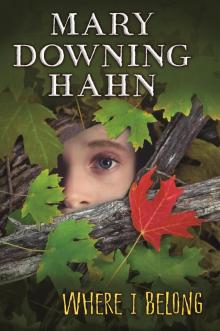 Where I Belong
Where I Belong The Spanish Kidnapping Disaster
The Spanish Kidnapping Disaster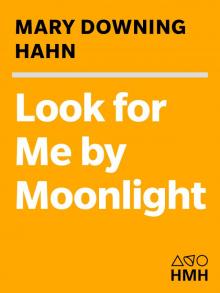 Look for Me by Moonlight
Look for Me by Moonlight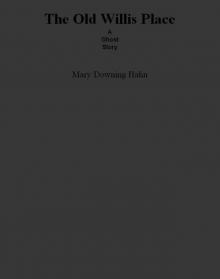 The Old Willis Place
The Old Willis Place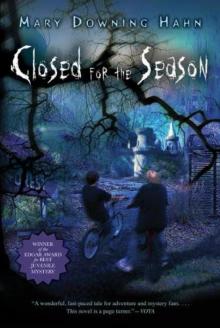 Closed for the Season
Closed for the Season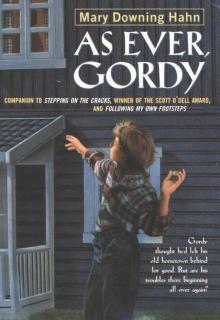 As Ever, Gordy
As Ever, Gordy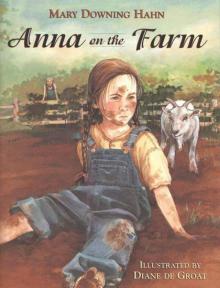 Anna on the Farm
Anna on the Farm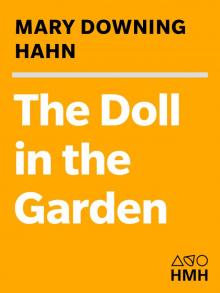 The Doll in the Garden
The Doll in the Garden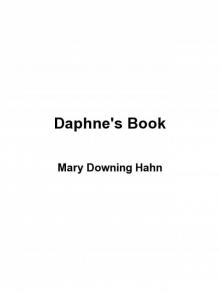 Daphne's Book
Daphne's Book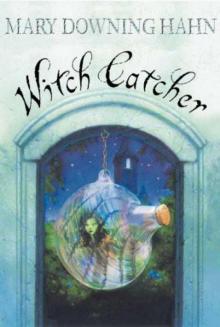 Witch Catcher
Witch Catcher The Gentleman Outlaw and Me--Eli
The Gentleman Outlaw and Me--Eli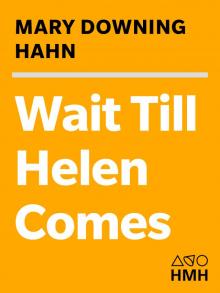 Wait Till Helen Comes
Wait Till Helen Comes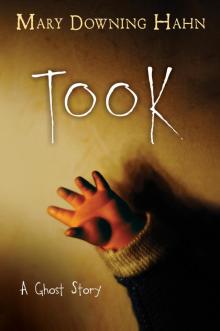 Took
Took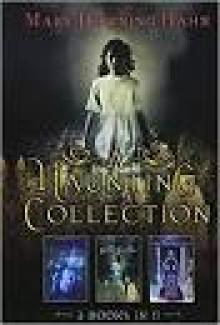 A Haunting Collection
A Haunting Collection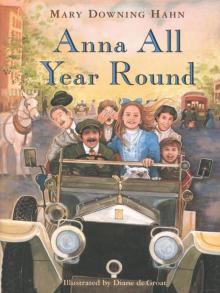 Anna All Year Round
Anna All Year Round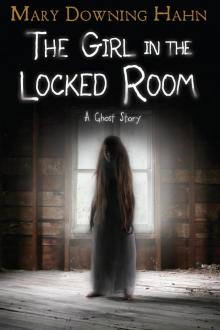 The Girl in the Locked Room
The Girl in the Locked Room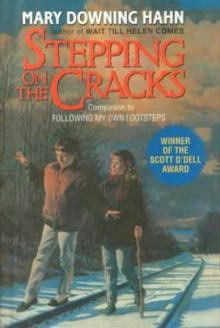 Stepping on the Cracks
Stepping on the Cracks